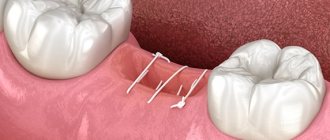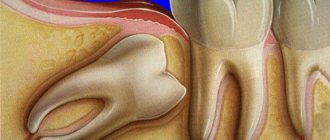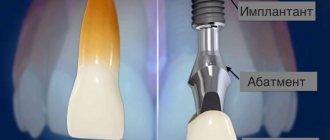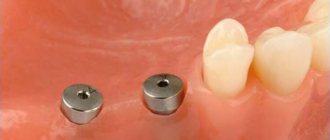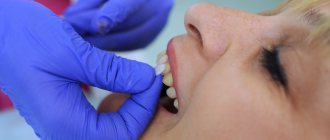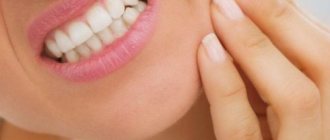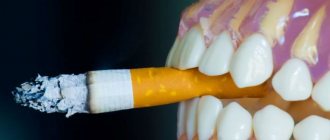Toothache is an unpleasant symptom, which in most cases indicates the development of a pathological process. Sometimes it can be accompanied by fever, and then the question arises: does fever occur with dental caries. We will answer this question in the article.
In this article
- Mechanism of caries development
- What are the symptoms of caries?
- What complications of caries can cause fever?
- Temperature during pulpitis
- Temperature with periodontitis
- The danger of fever due to toothache
- Why does the temperature rise after caries treatment?
Mechanism of caries development
Caries, according to experts, is the most common disease in the world, occurring in more than 90% of the world's population. Despite this, many people have only a superficial knowledge of tooth decay. Therefore, questions often arise about possible symptoms of the disease, in particular, whether the temperature can rise with caries. To understand, let’s first consider what the carious process is. Essentially, this is the slow destruction of a tooth under the influence of various factors, the main ones of which are oral bacteria and carbohydrate foods.
Microbes with cariogenic effects feed on sugars and convert them into acids, which cause destruction of dental tissue. If a person does not remove plaque (colonies of bacteria on teeth) well and at the same time eats a lot of carbohydrates, he creates favorable conditions for the development of caries.
This pathological process in most cases develops gradually. Acids first attack the enamel, then penetrate the dentin, damaging the dental tissues deeper and deeper. If caries is not cured in time and the deep spread of pathology is not stopped, sooner or later caries will develop into pulpitis or periodontitis. These are severe conditions in which the tissues of the pulp (neurovascular bundle) and periodontal tissue (they surround the tooth) become inflamed.
Alveolitis sockets
Even after the tooth itself has been removed, problems may arise. But this is normal, the pain may last for two more days after removal. If the operation was complex, the pain will last a week, gradually fading away. When the temperature rises, this indicates that the tooth socket is inflamed due to infection, alveolitis.
The blood clot may break if the rules of conduct during recovery prescribed by the doctor are not followed. Although compliance with all the rules does not guarantee preservation from complications. The latter can occur, for example, in the case of a patient’s reduced immunity or medical errors.
Symptoms of alveolitis: temperature rises to 39; intense pain where the tooth was removed; gray plaque at the site of the hole; putrid odor from the mouth; swelling on the face; lymph nodes are enlarged.
What are the symptoms of caries?
Symptoms of caries directly depend on its stage, that is, on how deep the damage is.
- Spot stage.
The earliest stage of caries development is practically asymptomatic. Nothing bothers the person, there is no hole in the tooth, but the process of demineralization of the enamel has already begun. This is indicated by a small white spot. Of course, at the early stage of caries the temperature does not rise.
- Superficial caries.
This is the stage when a hole appears in the tooth, but it is still concentrated in the enamel area and has not spread to the dentin. The doctor can easily detect a defect in the tooth surface during a visual examination. At this stage, pain may occur in response to irritants (hot or cold, sweet or salty food), and the sensitivity of tooth enamel may increase. Body temperature is normal.
- Average caries.
It is characterized by periodic pain and a carious cavity, which is easy to feel even with the tongue. As in earlier stages, with average caries the temperature does not rise.
- Deep caries.
This is the latest stage of the carious process. The bottom of the carious cavity is located in close proximity to the pulp, the sensitive part of the tooth. Therefore, a person feels acute pain and discomfort while eating. Pain also occurs during a dental examination using a probe. Although deep caries is the most advanced form of the disease, even this stage is not characterized by an increase in temperature.
Thus, with ordinary caries the temperature should not rise. However, complications of an advanced carious process can lead to such a symptom.
Features of the procedure
Tooth extraction is not performed without indications. We perform treatment either planned or emergency. In both cases, a preliminary diagnosis is carried out.
The reason for the procedure may be:
- periodontitis or periodontitis;
- root canal trauma;
- planned orthopedic treatment;
- complex tooth crown injury;
- developmental anomalies;
- neoplasms in the tooth area.
Extraction can be carried out in a simple way, when the crown is simply separated from the gum tissue and the entire tooth is removed, or in a complex way, in which the dentist dissects the gum or periosteum.
The danger of fever due to toothache
Thus, if toothache and other dental symptoms are accompanied by an increase in temperature, in most cases these are indicators of pulpitis or periodontitis. Without treatment, these diseases can be dangerous because the infection will spread to other organs. Therefore, if an adult or a child’s body temperature rises during toothache, you should immediately consult a doctor.
Otitis media
Fever and toothache do not always occur only with pathologies associated with teeth. Sometimes they appear due to otitis media. The area of the tympanic cavity in the middle ear becomes inflamed. This happens due to various infections - for example, ARVI.
- Treatment of cystitis in women and men. How to properly treat cystitis?
Symptoms:
- the appearance of pain in the ears;
- hearing loss;
- painful sensations radiating to the jaw;
- heat.
Interesting ! Since pain from otitis media radiates into the jaw where the molars are located, it is often perceived as dental pain.
With otitis media, such problems can also be observed
Why does the temperature rise after caries treatment?
Sometimes a slight increase in temperature is observed after treatment of the carious process. Most often this happens in the following cases:
- After a complex invasive procedure, such as root canal cleaning. This is how the body reacts to interference.
- In case of infection (after therapy for purulent periodontitis with a cyst or granuloma). An infectious process can occur due to unprofessional treatment, as well as if the patient does not follow the dentist’s recommendations after the procedure.
- Severe stress. It's no secret that even some adults are afraid to have their teeth treated, and a natural reaction to stress can be an increase in body temperature.
- Sometimes an elevated temperature is nothing more than a symptom of an incipient ARVI, which simply coincided with a visit to the dentist.
If you have a fever after treatment for caries or another dental problem, you should pay attention to your general condition. If you feel normal, if the thermometer does not show above 38°, you can wait a couple of days until the temperature returns to normal. If this does not happen on the third day, you should consult a doctor.
You cannot postpone a visit to the dentist if the temperature is very high (38.5-40 degrees), there is general weakness, headache, inflammation of the lymph nodes, severe pain in the area of the treated tooth, redness and swelling of the gums. Such symptoms may indicate a progressive inflammatory process.
Consumer reviews about Asepta Active mouthwash
julia-06 (irecommend.ru):
“A very good rinse for problem gums.
She had never encountered the problem of bleeding gums, but at her next visit to the dentist she noticed that when she only lightly touched her gums, they began to bleed. So the dentist gave me a mini version of Paradontax toothpaste and advised me to use a mouthwash after brushing my teeth. Mom bought Asepta active mouth rinse.
For some reason I used to be very skeptical about such remedies, but as it turned out, in practice it helps very well. My problem went away completely, my gums stopped bleeding. I don’t even want to read the ingredients and go into its details, it’s unlikely that everything is super natural, but since it helps, I give the mouthwash a solid 5 points. Of course, each case is individual, but I will recommend it based on my experience. And the price of the rinse aid is quite reasonable.”
Ekaterina773 (irecommend.ru):
“I use Asepta mouthwash in combination with toothpaste and gel from the same company. My dentist recommended it to me, and I highly recommend it to you! My gums stopped bleeding after the second use. The mouthwash, unlike the paste, has an astringent effect, and makes the tongue a little numb. It costs around 150 rubles, but exceeds this money 1000 times.”
Sources:
- The role of anti-inflammatory rinse in the treatment of periodontal diseases (L.Yu. Orekhova, A.A. Leontyev, S.B. Ulitovsky) L.Yu. OREKHOVA, Doctor of Medical Sciences, Prof., Head of Department; A.A. LEONTIEV, dentist; S.B. ULITOVSKY, Doctor of Medical Sciences, Prof. Department of Therapeutic Dentistry of St. Petersburg State Medical University named after. acad. I. P. Pavlova
- Report on clinical trials of anti-inflammatory balm for gums "Asepta" adhesive, St. Petersburg State Medical University, 2007
- Report on determining/confirming the preventive properties of commercially produced personal oral hygiene products: Asepta toothpaste used in combination with Asepta mouthwash and Asepta gum balm Head. Department of PFS Doctor of Medical Sciences Professor S.B. Ulitovsky St. Petersburg State Medical University named after Academician I.P. Pavlova. Faculty of Dentistry. Department of Preventive Dentistry.
What to do: treat a wisdom tooth or remove it?
Many people are often interested in the question: is it better to use the services of a dentist at the stage of intramaxillary development and remove a rudimentary tooth so that it does not create problems later?
However, most experts agree that preventive removal of eights is unacceptable. When the tooth has erupted correctly and does not cause any discomfort, it can be preserved. The main thing is to carefully observe the rules of hygiene and visit the dentist on a regular basis to monitor and perform hygiene procedures.
Removal is resorted to in cases where conservative treatment methods cannot achieve the desired result.
What causes root canal inflammation?
When pain appears, it indicates the need for treatment. Otherwise, the infection from the focus of purulent inflammation can spread to the entire circulatory system, causing:
- atrophy of the jaw bone tissue;
- gangrenous bone lesions;
- tissue necrosis in the inflamed area;
- the occurrence of cardiovascular diseases;
- and in the most severe case, with weakened immunity, blood poisoning and even death.
The problem is that pulp inflammation is not always accompanied by pain symptoms. Therefore, it is so important to visit your dentist regularly, as well as inform him about all changes in your health status and about newly diagnosed diseases of systems and organs.




